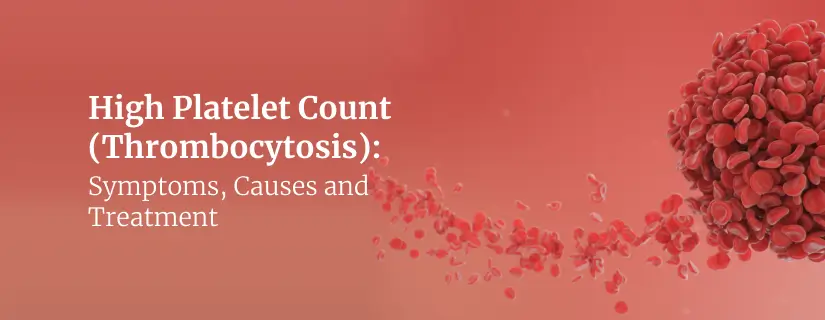-
Doctors
-
Specialities & Treatments
Centre of Excellence
Specialties
Treatments and Procedures
Hospitals & Directions HyderabadCARE Hospitals, Banjara Hills CARE Outpatient Centre, Banjara Hills CARE Hospitals, HITEC City CARE Hospitals, Nampally Gurunanak CARE Hospitals, Musheerabad CARE Hospitals Outpatient Centre, HITEC City CARE Hospitals, Malakpet
HyderabadCARE Hospitals, Banjara Hills CARE Outpatient Centre, Banjara Hills CARE Hospitals, HITEC City CARE Hospitals, Nampally Gurunanak CARE Hospitals, Musheerabad CARE Hospitals Outpatient Centre, HITEC City CARE Hospitals, Malakpet Raipur
Raipur
 Bhubaneswar
Bhubaneswar Visakhapatnam
Visakhapatnam
 Nagpur
Nagpur
 Indore
Indore
 Chh. Sambhajinagar
Chh. SambhajinagarClinics & Medical Centers
Book an AppointmentContact Us
Online Lab Reports
Book an Appointment
Consult Super-Specialist Doctors at CARE Hospitals
High Platelet Count (Thrombocytosis): Symptoms, Causes and Treatment
Updated on 28 June 2024

High platelet count, or thrombocytosis, happens when your body makes too many platelets, the tiny blood cells that help your blood clot. While you need platelets to stop bleeding, having too many can cause serious health problems. This guide will explore why it happens, the signs to watch for, how doctors diagnose it, and the best ways to manage it. Our goal is to help you understand and take control of this condition so you can stay healthy and worry-free.
Causes of High Platelet Count
There are several potential causes of high platelet volume, including:
- Reactive Thrombocytosis: This is the most common type of high platelet count, often triggered by conditions such as an infection, inflammation, or tissue damage. These factors stimulate the body to cause high platelet volume to aid in the healing process.
- Essential Thrombocythemia: This is a rare, chronic blood disorder characterised by the overproduction of platelets due to any genetic alteration in the bone marrow. The exact cause of this condition is not fully understood.
- Myeloproliferative Disorders: Certain blood cancers, such as polycythemia vera and myelofibrosis, can lead to an abnormal increase in platelet production.
- Iron Deficiency Anemia: In some cases, a deficiency of this micronutrient can stimulate the production of more platelets to compensate for the reduced red blood cell count.
- Splenectomy: Our spleen filters and removes old or damaged platelets. The spleen removal can result in a higher platelet count.
- Medications: Certain medicines, such as chemotherapy agents, can occasionally cause an increase in platelet production as a side effect.
Symptoms of High Platelet Count
In many cases, a high platelet count does not produce any noticeable symptoms. However, some individuals may experience the following:
- Headaches: The increased blood viscosity associated with high platelet count can lead to persistent or recurring headaches.
- Dizziness: High platelet count can sometimes cause circulatory issues, resulting in feelings of dizziness or lightheadedness.
- Numbness or Tingling: Increased platelet levels can lead to poor circulation, particularly in the extremities, causing numbness or tingling sensations.
- Excessive Bleeding or Bruising: While high platelets are typically associated with an increased risk of blood clots, in some cases, the platelets may not function properly, leading to excessive bleeding from minor cuts, nosebleeds, easy bruising, or bleeding from your mouth or gums.
- Abdominal Discomfort: A high platelet count can cause an enlarged spleen or other abdominal organs, which can cause discomfort or a feeling of fullness. It is important to remember that the presence or absence of the above-mentioned symptoms does not indicate the severity of the condition. Routine medical check- ups and monitoring are crucial for individuals with high platelet counts.
Diagnosis of High Platelet Count
The diagnosis of high platelet count typically begins with a routine blood test known as a complete blood count (CBC). This test measures the number of various blood cells, including platelets. If the platelet count is elevated, doctors may recommend further diagnostic tests, such as:
- Peripheral Blood Smear: A microscopic assessment of a blood sample can help identify the size, shape, and appearance of the platelets, which can provide additional clues about the underlying cause.
- Bone Marrow Aspiration and Biopsy: Sometimes, doctors may extract a sample of bone marrow and analyse it to determine the cause of the high platelet count, particularly if an underlying blood disorder is suspected.
- Genetic Testing: Genetic analysis may be performed to identify specific genetic mutations associated with certain blood disorders that can lead to thrombocytosis.
- Imaging Tests: Depending on the suspected cause, doctors may conduct various imaging tests, such as ultrasound, CT scan, or MRI, to examine the spleen or other organs affected by the high platelet count.
Treatment for High Platelet Count
The treatment for high platelet count will depend on the underlying cause, the condition's severity, and any associated symptoms or complications.
Common treatment approaches for high platelet count include:
- Medications: Doctors may prescribe specific medicines to lower platelet production or enhance their destruction.
- Phlebotomy: In some cases, a procedure called phlebotomy, which involves removing a small amount of blood, may be performed to reduce the platelet count temporarily.
- Antiplatelet or Anticoagulant Therapy: In individuals with a high risk of blood clots, medications that prevent or break down clots may be prescribed. Monitoring and Lifestyle Modifications: Regular monitoring of platelet levels, with lifestyle changes such as a healthy diet, exercise, and stress management, may help manage high platelet count.
Complications of High Platelet Count
While high platelet count can often be managed effectively, it is essential to be aware of the potential complications if left untreated or uncontrolled. These complications include:
- Blood Clots: The increased number of platelets can lead to an enhanced risk of blood clot formation, which can potentially obstruct blood vessels and cause serious medical emergencies, such as heart attacks, strokes, or deep vein thrombosis.
- Bleeding and Bruising: In some cases, the high platelet count can paradoxically lead to increased bleeding and bruising, as the platelets may not function properly.
- Splenomegaly: The spleen may enlarge (splenomegaly) due to the increased burden of filtering and removing the excess platelets, which can cause discomfort and other complications.
- Transformation to Leukaemia: In rare cases, certain types of high platelet count, such as essential thrombocythemia, may progress to more serious blood cancer, such as acute myeloid leukaemia.
- Pregnancy Complications: A high platelet count during pregnancy can increase the chances of pregnancy-related complications, such as preeclampsia, placental abruption, and foetal growth restriction.
Conclusion
High platelet count, or thrombocytosis, is a medical condition that requires careful monitoring and management. Understanding the underlying causes, recognizing the potential symptoms, and seeking timely diagnosis and appropriate treatment can reduce the risk of associated complications.
By working closely with doctors, individuals with high platelet counts can take proactive steps to maintain their platelet levels within a healthy range, reduce the likelihood of serious health issues, and improve the person's overall well-being. Ongoing monitoring and a personalized treatment plan are crucial for effectively managing high platelet counts and ensuring a better quality of life.
FAQs
1. What is the leading cause of thrombocytosis?
The primary cause of thrombocytosis, or high platelet count, is reactive thrombocytosis, which can be triggered by infection, inflammation, or tissue damage. Other potential causes include essential thrombocythemia, a rare blood disorder, and certain myeloproliferative disorders.
2. Is thrombocytosis a serious condition?
Thrombocytosis can be a serious condition, mainly if left untreated or uncontrolled. A high platelet count increases the risk of the formation of blood clots. Blood clots can lead to life-threatening complications (heart attacks, strokes, and deep vein thrombosis). However, the severity of the condition depends on the underlying cause and the individual's overall health status.
3. Is thrombocytosis treatable?
Yes, thrombocytosis is a treatable condition. The treatment approach depends on the underlying cause of the high platelet count. Treatments may include medications to reduce platelet production, phlebotomy to lower the platelet count temporarily, and management of any underlying conditions contributing to thrombocytosis.
4. How can I normalise my platelet count naturally?
There are a few lifestyle changes that may help to normalise a high platelet count naturally:
- Eat fruits, vegetables, and whole grains as a part of your diet. The nutrients in a healthy diet can contribute to healthy platelet production.
- Regular exercise or physical activity can regulate the body's inflammatory response and platelet production.
- Manage stress by practicing relaxation techniques, such as meditation or yoga, as stress can contribute to increased platelet production.
- Ensure adequate iron intake, as iron deficiency can sometimes lead to a compensatory increase in platelet count.
However, it's important to remember that natural remedies alone may not be sufficient for individuals with an underlying blood disorder or other medical condition contributing to a high platelet count. In such cases, it is crucial to work closely with a doctor to develop an appropriate treatment plan.
5. Can a high platelet count cause blood clots?
Yes, a high platelet count can increase the risk of blood clots. The excess platelets can contribute to the formation of clots, which can obstruct blood vessels and cause heart attack, stroke, and DVT (Deep Vein Thrombosis). Individuals with high platelet counts may require antiplatelet or anticoagulant medications to help reduce the risk of blood clots.
To Book an Appointment, call:
ENQUIRY FORM
SELECT CATEGORIES
-
Neurosciences (16)
-
Neurology (37)
-
Neurosurgery (14)
-
Orthopaedics (48)
-
Oncology (33)
-
Obstetrics and gynecology (51)
-
Pulmonology (23)
-
Urology (20)
-
Nephrology (13)
-
Psychiatry (7)
-
Dietetics and Nutrition (111)
-
General Medicine (63)
-
Cardiac Sciences (30)
-
Vascular & Endovascular Surgery and Interventional Radiology (10)
-
Gastroenterology (46)
-
Endocrinology (23)
-
Plastic Surgery (10)
-
Critical Care Medicine (5)
-
COVID-19 (16)
-
Dermatology (16)
-
Emergency Care (1)
-
Ophthalmology (4)
-
Pediatrics (14)
-
Laparoscopic and Bariatric Surgery (8)
-
ENT (15)
-
Kidney Transplant (1)
-
Liver Transplantation and Hepatobiliary Surgery (5)
-
General Surgery (3)
-
Internal Medicine (5)
-
Medicine Information
Low Potassium (Hypokalemia): Symptoms, Causes, Treatment and Home Remedies
HeartBurn: Symptom, Causes, Risks and Treatment
YOU MAY ALSO LIKE
RECENT BLOGS
-

Direct Anterior Approach in Total Hip Replacement: Advantages and Challenges
10 April 2025
Read More
-

Zinc Deficiency: Signs and Symptoms, Causes, Treatment
9 April 2025
Read More
-

Chest Pain When Coughing: Causes, Treatment and Home Remedies
9 April 2025
Read More
-

12 Health Benefits of Eating Mushrooms
8 April 2025
Read More
-

7 Health Benefits of Blood Donation You Should Know About
8 April 2025
Read More
-

Implantation Bleeding Vs Periods: Know the Difference
28 February 2025
Read More
-

Bloating During Ovulation: Symptoms, Causes and Remedies
28 February 2025
Read More
-

Itching During Dengue: Causes, Treatment and Home Remedies
18 February 2025
Read More
Have a Question?
If you cannot find answers to your queries, please fill out the enquiry form or call the number below. We will contact you shortly.




